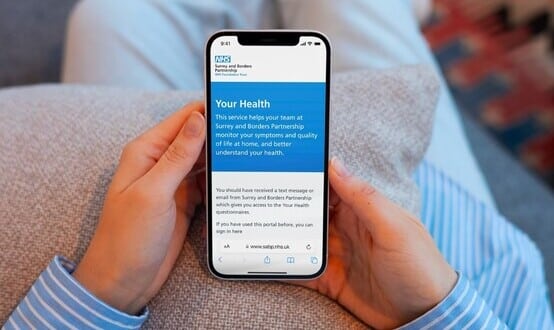Just 1 in 10 outpatient appointments conducted via video, RCP survey finds

Just one in 10 doctors have recently conducted outpatient appointments via video despite many believing the technology could be used to ease pressure on services, a survey has found.
The Royal College of Physicians asked its members about new ways of working and barriers they currently faced, and found very few were turning to technology to provide appointments.
When asked about alternatives to face-to-face consultations in the college’s Barriers to Care survey, fewer than 10% of respondents said they had conducted more than 4% of their outpatient appointments by video in the last week.
Yet 70% of those surveyed said they believed at least some of their appointments could be carried out by video consultation.
The outlook was better for telephone appointments, but only slightly.
Some 18% of respondents said they had conducted between 10% and 20% of there appointments via telephone, while 11% said they carried out a similar amount via email.
Professor Andrew Goddard, president of the Royal College of Physicians, said: “Doctors and other healthcare workers all want to provide the best care possible for their patients and face some familiar and long-standing barriers to doing so.
“One way in which the NHS can meet the rising demands placed upon it is to provide care in new and innovative ways. Given the pressures they are under and, in many cases, the poor IT infrastructure they have to work with, it isn’t altogether surprising that more doctors aren’t already conducting consultations using video and other technological solutions, but there is enthusiasm for change and the RCP will continue to work with NHS England to transform services.”
The slow uptake of digital services is at odds with commitments in the NHS Long Term Plan to avoid up to a third of face-to-face appointments.
The plan, published a year ago, commits to a redesign of services over the next five years to reduce pressure on outpatient appointments, including through the use of digital.
A Kings Fund report from summer 2019 found a lack of funding for digital technology had left finance directors with “little or no” confidence that physical outpatient appointments would be reduced.
It found just half of NHS finance directors surveyed were “somewhat” confident that outpatient numbers could be reduced, while the rest had little or no confidence.
The Barriers to Care survey is slightly more optimistic, with 20% of respondents agreeing that up to a fifth of consultations could be conducted via video.
A third also thought a similar proportion could be conducted by telephone, while a quarter believed a similar proportion could be conducted by email.





7 Comments
It is very positive for the future delivery of primary care to see so many GPs enthusiastic about using new technology to conduct appointments, and the growth in telephone triage is something we are witnessing in the market. However, it is unsurprising to see that many report they are not using video solutions; it is technology that is right for some consultations, but is not in a ‘one size fits all’ approach. For example, our research shows that doctors are using our video on demand service to successfully conduct consultations with parents of children with dermatological issues.
“1 in 10 outpatient appointments conducted via video” is not the same as “one in 10 doctors have recently conducted outpatient appointments via video”, especially when the benchmark is 4% or more of a week’s consultations. The true picture must be far lower than 10%.
I think what people “believe” tech will help with is usually wide of the mark. Ask these folks which 20% and they’ll be staring at their shoes. If it really is 20% that’s not an investment problem, as you could easy borrow the money for that return.
“People who say it can’t be done should not interrupt those who are doing it.”
That many!
I don’t think the college of physicians surveyed GPs! This presumably a survey of hospital doctors
Correct – the survey is of members of the RCP, so unlikely to include GPs (although I expect some GPs are RCP members as well?).
Digital Health team – is there a reason you often don’t include links to the source when you report on surveys, studies, research, etc?
Hi Tim, that’s been amended now. The original survey and press release can be found on the RCP website if you’re interested.
Comments are closed.